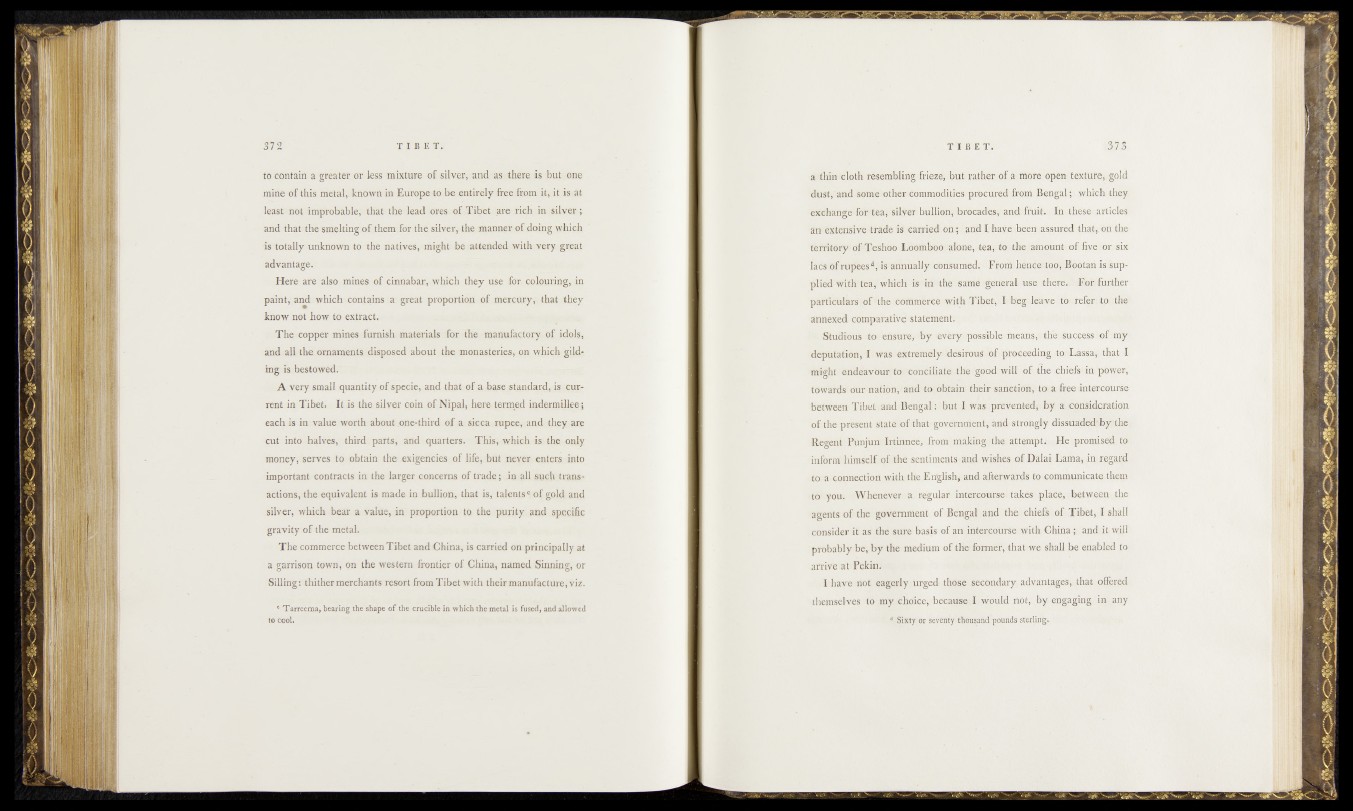
to&Gntain { greater or less mixture ®f silver, and as there as but one
mine ofthismetal,.known in Eurapeta; be entirely free from it, it is at
leatrtt'n©f.impinbable, tha# ihejiead ores of Tibet are rich in sUver;
and that« the smelting ofthemfcr the silver, the manner of doing whieh
istotallyunknown to the natives, might be attended with :.vaiygreat
advantage.
Here are also mines of cinnabar, which they use for colouring, ip
paint, and which contains a great proportion of mercury, that they
know not how to extract..
The copper mines furnish materials for the manufactory of idols,
and all the ornaments disposed about the monasteries^ op which gilding
is bestowed.
A very small quantity of specie, and that of a base standard, is current
in Tibet, Iris the silver coin of Nipal, here termed foderroillge j
each is in value worth about .one-third of a sicca rupee, and they are
cut into halves, third parts, and quarters. This, which is the only
money, serves to obtain the exigencies of life, but never enters into
important contracts in the larger concerns of trade; in all such transactions,
the equivalent is made in bullion, that is, talentsc of gold and
silver, which bear a value, in proportion to the purity and specific
gravity of the metal.
The commerce between Tibet and China, is carried on principally at
a garrison town, on the western frontier of China, named Sinning, or
Silling: thither merchants resort from Tibet with their manufacture, viz.
f Tarreema, bearing the shape of the crucible in which the metal is fused, and allowed
to cool.
a thinrGloth resembliiigjfemz.eVbU't rather,of a<®|Qr^'0^|p^tfi.xtui'ei?gold
dust*’and fcome^mher'commoditi'esrpibcuirpd from Bengal-; wfii?h -they}
exchange folrUbaj siher Lulliotif brocades*,’,and lmit. In these aiticles
an S^tdtlslVfe'-tr&de-is «abided on ffl and I havfiibsexi'.Ussurgd» that^lon the
tfefritory: dfoTeshfeO Lo’omboGVa'lone, .teapfori the i a t o g u p t ! o r ,six
lattS '6fir-iS^es‘*,; is^fifefi'alJy-dotisumed. Ftom,' Mncdtoo?^'©®t^n^Mi§wjf-
'plifed? which is in- the same general’ m;Wtfch4toi
paftie%dars:ihf4heTdP'Mtt^r6dfWith Tibet, vt beg Jeayeijttopl'bfeEs'to; tthe“
annexed comparative statement! ^
Studious to eflsUtoi .'by «every,‘possible means,»diefeskeqe^Ss%)f miy
deputation, I was extremelytldesitouS-^fcpfotseedirig tonhassajufefi'Pit I
might endeavduf^to conciliate: theigso’d^will;£»&, the yfiMpfs'lindpbypr,
towEttcfedor-flation, and to’ obtain' their sanction, tajp^fjeeintercourse
Between TfoBS&'aitd Bengal: but I Was prfeVeatedj.by a..conMdbrafion
of-the* present state .of that'govekmiemVasrifo strongly dissdatied§by * the
Regent Punjun Irtinnee, from making*the, attempt.* .He promised-tp*
inform’himself of the sentiments , and wishes of Dalai Lama,, am regard
to a-connection with the Englisfo and afterwards to communicate them
•to* you: Whenever a regular intetcourse; takes- .pladesi .’between tfie
agents of the government of Bengal’ and thfenhle^slof Tibet, I shall
consider it as the sure basis of an. intercourse witip-China and it wfil
probably be, by the medium of the former, that we shall be enabled to
arrive at Pefeini H
I have not eagerlyjurged* thdss secondary advantages, that offered
themselves to my choice, because f would nbt,s,by engaging in any
d Sixty or seventy thousand pounds sterling. ‘ !